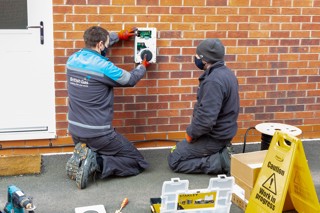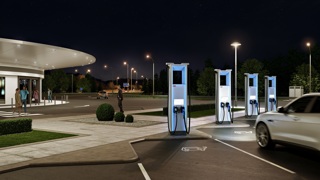Power and automation technology group ABB is almost as old as electrification itself, with its origins dating back more than 130 years. It was founded to take advantage of a then-new technology called electricity, and has remained at the forefront of the sector ever since.
Recently this involvement includes working in the electric vehicle (EV) charging industry and some of its newest technologies include a 7.4kW Terra home electric vehicle charge point, and a 350kW high power charger.
ABB, a member of Fleet News sister brand Smart Transport, is also, fittingly, one of the companies in the UK leading the switch to all-electric fleets, with a commitment to completing the transition by 2025 as part of its net zero ambition.
“In the UK, our fleet covered 6.8 million business miles in 2019,” says Craig Prendergast (above), country HR manager at ABB UK, which has 500 company cars.
“Once the transition to an all-electric fleet is completed, we estimate our overall carbon footprint could be reduced by around 20%.”
These figures were confirmed in an audit for the Certified Emissions Measurement and Reduction Scheme (CEMARS), which is one of the world’s first internationally-accredited greenhouse gas certification schemes.
Annually, this checks that both a company’s methodology to measure carbon emissions is accurate and the reduction targets it sets are sufficiently challenging.
Power and automation technology group ABB is almost as old as electrification itself, with its origins dating back more than 130 years. It was founded to take advantage of a then-new technology called electricity, and has remained at the forefront of the sector ever since.
Recently this involvement includes working in the electric vehicle (EV) charging industry and some of its newest technologies include a 7.4kW Terra home electric vehicle charge point, and a 350kW high power charger.
ABB, a member of Fleet News sister brand Smart Transport, is also, fittingly, one of the companies in the UK leading the switch to all-electric fleets, with a commitment to completing the transition by 2025 as part of its net zero ambition.
“In the UK, our fleet covered 6.8 million business miles in 2019,” says Craig Prendergast (above), country HR manager at ABB UK, which has 500 company cars.
“Once the transition to an all-electric fleet is completed, we estimate our overall carbon footprint could be reduced by around 20%.”
These figures were confirmed in an audit for the Certified Emissions Measurement and Reduction Scheme (CEMARS), which is one of the world’s first internationally-accredited greenhouse gas certification schemes.
Challenging targets
Annually, this checks that both a company’s methodology to measure carbon emissions is accurate and the reduction targets it sets are sufficiently challenging.
“When we interrogated the data, it showed our highest carbon emission contributors were energy consumption, air travel and business mileage,” says Prendergast.
“Those contribute to just more than 50% of our total carbon footprint within the UK.
“One of our values, as a company, is curiosity: we like to be at the forefront of technology for our customers, so we wanted to do this for ourselves as well. We saw this as a good opportunity to explore an e-fleet within ABB UK.”
Craig Prendergast, country HR manager at ABB UK
The company leases its cars on four-year terms, and its first step was to carry out research with funding partner Arval UK. “They were great in terms of providing advice, data and relevant information,” he adds.
“We knew we would be early adopters of the technology so it was important we teamed up with them because the landscape of EVs is changing significantly and the charging infrastructure is really developing.”
 Organic shift
Organic shift
It was clear from the outset that switching the entire fleet to battery electric vehicles (BEVs) overnight was neither cost-efficient or feasible, so it would have to be an “organic shift”, according to Prendergast.
He adds: “Typically, our car leases run for four years and to go through the rotation to replace the fleet would take us to the beginning of 2025.
“We formulated the business case and it came with a cost – I’m not going to say it didn’t – but it was a cost the organisation was prepared to invest in to achieve what we wanted in terms of improving our carbon footprint, as well as the social responsibility we have as a large employer in the UK.
“However, the additional cost was not as great as we thought it was going to be, and we are seeing the difference in wholelife cost between a BEV and ICE (internal combusion engine – petrol and diesel) vehicle narrow over our four-year terms.”
ABB UK began by assembling anoperational project team to engage with stakeholders, particularly the business, due to the initial higher costs of BEVs compared with equivalent diesel and petrol models.
It took into account external analysis as well as looking at what other organisations electrifying their fleets have done, and came up with a comprehensive project and implementation plan.
ABB UK also enlisted the help of its work council to win buy-in internally, while employees were consulted to ensure they were on board with the BEV policy.
Some ABB UK employees were already using BEVs and their help was enlisted to get the company’s message across.
“We didn’t shy away from anything because we know there are challenges with EVs, we know there are some limitations in the technology in terms of range and range anxiety,” says Prendergast.
“We did recognise the level of change management we would be taking on. To change just a vehicle is fairly linear, but this is a journey we have to take our employees on along with us.
“We ran a number of information sessions, had testimonials and videos from those early adopters, and our fleet partner Arval also did some education sessions.
“There have been some concerned employees, but, through the change management process, we’ve tried to address their concerns, whether it be through education or a cultural change."
Craig Prendergast, country HR manager at ABB UK
“The messaging and the engagement of our employees was not just about them, but also what we stand for as an organisation and where we’re going.”
As well as sustainability benefits, Prendergast says the shift to BEVs will also have positive health and safety implications.
“The range of the EVs forces people to stop and have a break to charge, and that is particularly true for our sales and service personnel who are covering large mileages each year,” he adds.
ABB UK has also worked with DriveTech to develop and implement a specific BEV risk management programme.
Uninterrupted service
One of the key requirements of its shift to an all-electric fleet was that the transition would not affect the service it delivers.
“We have service engineers that can be on 24-hour call-out and we must not impact the customers and our ability to service them by moving to EVs,” says Prendergast.
“There were a number of key mandates we set about with EVs that we couldn’t compromise on and that was one of them.”
Since the policy was launched around 12 months ago, employees have been able to order only BEVs, except in “extreme cases” where diesel vehicles have been allowed.
This is when an employee is not able to have a charge point installed at home and the local public charging network is insufficient.
“In these cases, the vehicle leases would take us into 2025, so still within our commitment,” says Prendergast.
“We know that over the four-year term the charging infrastructure will improve, so allowing these diesel vehicles will not impact our ambition to have a full EV fleet by 2025, but will enable us to work with time.”
At around the same time ABB UK was developing its BEV policy, it was launching its Terra 7.4kW home charging unit and decided it would provide and install them free at employee residences – where possible – when they take on a BEV.
“You don’t buy an iPhone and expect not to have a charger. So, providing a charge point shows a responsibility from us in supporting the development of infrastructure,” says Prendergast. “Our Terra units give about 30 miles of range an hour compared with the 10 miles an hour of a three-pin socket, and that makes the BEV more usable as it means we are less reliant on, I think, quite a weak public infrastructure compared with some more developed countries.
“It also helps with our branding and makes our employees proud of the product they have on the side of their house.”
 ABB UK has partnered with Centrica who will carry out the installation work of the Terra units, as well as offering aftersales services and infrastructure planning across the homes of ABB employees.
ABB UK has partnered with Centrica who will carry out the installation work of the Terra units, as well as offering aftersales services and infrastructure planning across the homes of ABB employees.
The company has so far taken on more than 80 BEVs since launching its policy and Prendergast says it is on track to meet its 2025 target.
“Coronavirus has undoubtedly had an impact in terms of vehicle supply and, more recently, the semiconductor shortage has also had an effect,” he adds.
“Also, the recent change by the Government to the plug-in car grant came as a big surprise to us. This had implications in terms of the way we positioned our grade thresholds with regards to the wholelife cost of the vehicle, for example, but we’ve maintained our commitment to BEVs.”
ABB UK also has a “handful” of commercial vehicles, and these will also be transitioned to an all-electric fleet by 2025, says Prendergast.
The work ABB UK has been undertaking is setting the global standard for the group, which operates in more than 100 countries.
“We’ve created a bit of momentum and the group now sees this as a natural roll-out because we’ve done it in the UK,” he says.
The Netherlands has also implemented a similar policy, while other countries such as Germany, Sweden and Norway are going through the same process.
On World Environment Day earlier this month (June 5), ABB released a strengthened commitment to reducing carbon emissions, committing to electrify its global 10,000-vehicle fleet by 2030, sourcing 100% renewable energy and establishing new energy efficiency targets as part of its new sustainability strategy.
“The move to electric vehicles is only part of our solution as we permanently look to reduce travel and embrace the digital world,” adds Prendergast.
“Coronavirus may have temporarily changed the way we work, but we can already see that our digital offerings, coupled with remote factory acceptance testing, are changing the way we interact with our customers and provide the best solutions.”
Craig Prendergast, country HR manager at ABB UK
Prendergast on... perk users
As well as job-need drivers, ABB UK also has perk users who can select either a cash allowance or a company car.
The current preferential benefit-in-kind tax rates for EVs has seen a renewed interest among employees in rejoining the company car scheme, but ABB UK is also encouraging them to buy BEVs even if they continue to take the allowance.
There are already a number of requirements for cash allowance vehicles such as age of vehicle, but imposing strict rules “becomes an interesting discussion” because the allowance is a benefit rather than a job-need car, says Prendergast.
“While we have a clear desire from a sustainability perspective, we are also a certified top employer in the UK and we have an ambition to maintain this status.
“We need to have some flexibility in our benefits to attract and retain employees. If we’re very restrictive in the cars we allow, it could be restrictive in terms of attraction and retention.”
Craig Prendergast, country HR manager at ABB UK
Instead, Prendergast says ABB UK uses education to help staff make informed decisions about vehicle choice. It also has a two-tier cash allowance system to incentivise BEV uptake.
“We have two cash benefits,” says Prendergast. “We have one for someone who privately purchases an ICE vehicle, but there is also a lifted allowance if somebody wants to buy their own EV.
“Our priority is the company fleet and the grey fleet will be something we’ll work on and manage over a period of time, but I think people will start to make their own choices quite freely in that space.”
Login to continue reading.
This article is premium content. To view, please register for free or sign in to read it.






















Login to comment
Comments
No comments have been made yet.